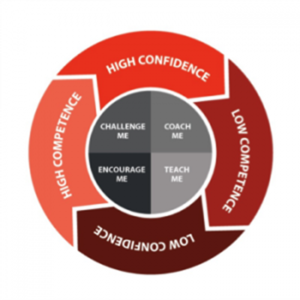4 Strategies To Effectively Navigate The Confidence-Competence Matrix

Leadership
April 20, 2021
Julia Felton
Herd Leader Of Business HorsePower Ltd
Topics
coach, Coaching, confidence, effective leadership, effective team, encouragement, leaders, Leadership, Overcoming Challenges, teaching, team development, TrainingAs a leader, we are all too familiar with the struggle that often exists between the need to get things done (results) and the need to build and maintain relationships, with clients and team members. As leaders, we need to be able to balance both but all too often coaching and mentoring our team members gets relegated down our to-do list as business-critical activities take precedent.
This is a fool-hardy strategy as ultimately it is our team members who get things done, and when they are engaged they deliver exceptional client service and increased productivity and productivity.
So how as a leader do we maximize the effectiveness of our time investing in our people. According to David Dye, President of Let’s Grow Leaders the secret lies in creating a series of micro-engagements. These consistent short development interventions win every time if used at the right time. So how do you know what to do when?
When team members are struggling with activities it is often as a result of one of two things:
- Their Level of Confidence
- Their Level of Competence
The Confidence-Competence Matrix provides a great framework for determining what is happening for your team member and more importantly how you can help them.
It enables you to identify who needs encouragement, coaching, more challenge, or training. This means that you don’t waste your time or their attention encouraging someone who needs a challenge or coaching someone who needs encouragement.
Now let’s look at each area in turn:
Challenge Me High-Competence/High-Confidence:
This could be a team member in the perfect sweet spot of positive energy and flow or maybe becoming a bit bored and longing for more. At best, they’re your A players, although the high confidence/competence combo can sometimes manifest itself in feelings of superiority, particularly if the rest of the team is weak.
Encourage Me: High-Competence/Low-Confidence:
The good news is you’ve got skills to work with. The low confidence may appear as disengagement, but don’t be fooled.
Coach Me: Low-Competence/High Confidence:
This team member needs help seeing their strengths and developmental opportunities more clearly. Offering feedback through 360 assessments, specific examples, and coaching will help bring their skills in line with their self-perceptions.
Teach Me: Low-Competence/Low Confidence:
This chicken or egg situation is still potentially solvable. Train and teach the skills the team member needs for success in the role. There may also be a skills miss-match, have deeper developmental conversations to determine if there is a better fit for them within your organisation.
I found this model to be invaluable this weekend when trying to ride out my pony Bracken. I wanted to ride her out on her own, without her friends, so I decided to take her to a place she has been before. That way I knew she would know where was going, however, I knew being without her friends for support it would be challenging. And sure enough whilst she had the competency of being able to get to the destination her complete lack of self-confidence derailed the process.
At first, I was frustrated and then quickly realised that what she needed was encouragement. She needed to know that I knew she could do it. She needed me to help her build her trust that she could do that. So rather than ride her I led her in hand along the route. Having me by her side gently encouraging and rewarding her made her feel braver and as we went along she grew in confidence.
So much so that by the time we got back to the start of the “ride” she wanted to keep going and do it again.
It was a powerful lesson in how knowing how to assess what is derailing our team members' performance and then knowing what intervention will best serve them in that moment.
Just imagine how effective you could be with just a few well-chosen words at the right time?.
Remember effective team development conversations happen in the moment at work and not just at team review meetings.







